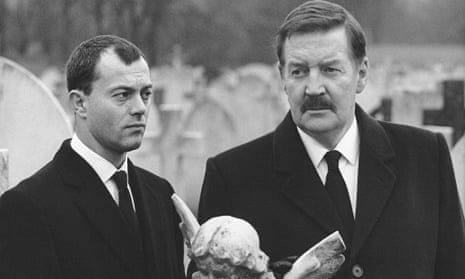It is the near future. After a wave of public revulsion at the excesses of corrupt bankers, the Labour party has enjoyed a landslide victory under a far-left leader. He’s got a mandate to revitalise the British economy on a more equitable basis and ditch the UK’s nuclear deterrent. His rise to power surprises and horrifies the establishment, as well as the US, who assumed he was the usual “bungling incompetent” under whose leadership previous attempts at British socialism had run aground. They tried every dirty trick on him, particularly media vilification. The Times, says the PM in his victory speech, called him a “simple-minded fool”. He duly takes the opportunity to thank the mass of “simple-minded fools” who just voted him into office.
This is the astonishingly prescient premise of A Very British Coup, a three-part drama broadcast on Channel 4 in 1988. Based on a novel by Labour backbench MP Chris Mullin and adapted by Alan Plater, its hero is Harry Perkins, a former steelworker from Sheffield who makes his name exposing banking malpractice. His nemesis is Sir Percy Browne, head of MI5, who behaves with Jeeves-like solicitude to the PM’s face, but is secretly plotting to subvert him – with the help of the military, a Rupert Murdoch-style newspaper mogul, the US, and even members of the unions and Labour itself. Perkins is only too aware of the machinations against him, calling them “people who work quietly, behind the scenes”, whereas he himself is a believer in full accountability and public inquiries, words which. The very notion makes the clandestine, aristocratic Browne blanche.
Ray McAnally is superb as Perkins, the embodiment of every red-blooded Labour supporter’s wishful thinking: the “if only” candidate of their dreams. Despite being in high office, he clings fast to his working-class origins – the shaving mug that was his sole inheritance, the tales of bar-room etiquette in Sheffield, the assurances to the media that he is “just a simple-minded northern lad”. A steelworker he was, however, and he is full of steely resolve, forged in still white-hot rage at the uncompensated death of his grandfather in an industrial accident.
Perkins won’t play the political game, departing from the scripts handed to him by civil servants. Travelling by train, he’s asked if he will abolish first class. “No, I’ll abolish second class,” he says. “I think all people are first class, don’t you?” Yet he’s also cunning, ruthless and capable of fighting dirty. “Your friends would do well to remember that,” he tells Lawrence Wainwright, his rival, centrist, proto-Blairite chancellor, who in cabinet meetings talks about “living in the real world”. Perkins outmanoeuvres him, calling him “ambitious, but fundamentally spineless”. Keith Allen, as his press secretary, provides sterling support, as does Tim McInnerny (aka Percy in Blackadder), playing sidekick to Browne.
The drama felt politically out of time in 1988. The public’s rejection of even as compromised a candidate as Neil Kinnock in 1987 didn’t speak of any great appetite for socialism. Sadly, McAnally died shortly after it was broadcast. A little later, the thawing of the cold war ushered in the supposed “end of history”, in which far-left politics were considered as extinct as the USSR and we were all supposed to be on the prosperous path to (neo)liberal democracy.
However, we’re in the future now – and with anger at an out-of-touch, super-rich elite growing, and with support for Jeremy Corbyn snowballing, A Very British Coup suddenly feels very ahead of its time. The simple-minded fools are rising again.

Comments (…)
Sign in or create your Guardian account to join the discussion